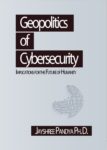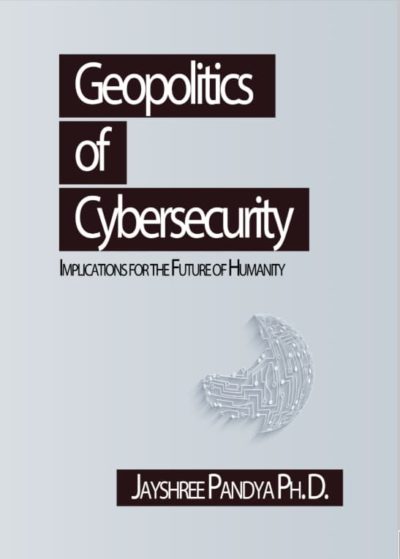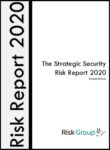Risk Group’s Founder and Chief Executive Officer, Jayshree Pandya Ph. D. pens new book on Geopolitics of Cybersecurity.
About The Book

Nations stand on the precipice of a technological tidal wave in cyberspace that is fundamentally altering aquaspace, geospace, and space (CAGS). In its size, scale, strength, and scope, the technology-triggered transformation that is emerging from cyberspace is unlike anything ever experienced before in prior industrial revolutions. The speed of the current ideas, innovations, and breakthroughs emerging from cyberspace has no known historical precedent and is fundamentally disrupting almost every component of a nation. While there is no easy way to compute how the on-going cyberspace-triggered transformation will unfold, one thing is clear: the response to its security must be collective.
As cyberspace fundamentally alters aquaspace, geospace, and space, there is a need to understand the security-centric evolutionary changes facing the human ecosystem. What is the knowledge revolution? Should we be concerned about the dual-use nature of digital technologies, the do-it-yourself movement, and the democratization of destruction? What are the implications of fake news and information warfare on global politics? Are we being surveilled? Is access to cyberspace a human right? Will we soon see digital walls? How will nations stay competitive? How do we govern cyberspace?
Geopolitics of Cybersecurity works to answer these questions, amidst a backdrop of increasing global competition, mistrust, disorder, and conflict. Conversations about cyberspace and technology are now inextricably linked to broader conversations affecting each one of us across nations, from trade policy and digital autonomy to cyber warfare and the weaponization of artificial intelligence. Ultimately, how nations handle these issues and conflicts will determine the fate of both cyberspace and humanity.
About The Author

Jayshree Pandya (née Bhatt), Ph.D., is a leading expert at the intersection of science, technology and security and is the Founder and Chief Executive Officer of Risk Group LLC. She is also the host of Risk Roundup podcast, a scientist, an expert in disruptive technologies, and a globally recognized Strategic Security Thought Leader and Influencer.
Dr. Pandya has been involved in a wide range of research, spanning security of and from science and technology domains. Her work is currently focused on understanding how converging technologies and their interconnectivity across cyberspace, aquaspace, geospace, and space (CAGS), as well as individuals and entities across nations: their governments, industries, organizations, and academia (NGIOA), create survival, security, and sustainability risks. This research is pursued to provide strategic security solutions for the future of humanity.
From the National Science Foundation to organizations from across the United States, Europe, and Asia, Dr. Pandya is an invited speaker on emerging technologies, technology transformation, digital disruption, and strategic security risks. Her work has contributed to more than 100 publications in the areas of science and commerce. She is the author of the books, Geopolitics of Cybersecurity and The Global Age. She writes about Artificial Intelligence on Forbes.
From The Author
As I began to put my thoughts together on the rising digital disorder, survival, and security of nations, I had to look back at our world’s evolutionary history. From the very first hunter-gatherers to the early agrarian societies to the rise of vibrant and innovative civilizations around the world, we can see in us not just an ability but a skill at working together towards a better collective future.
We are here today because we carry the genes of the forward-thinking members of our species: the ones who wisely chose to pool resources, to work together to solve common problems, and to overcome the difficulty in times of crisis. They did not look out just for themselves, choose isolation and protectionism, or forget the very meaning of civilization.
Although computer code, connected computers, the making of cyberspace, and each technology layer has brought complex problems to and from cyberspace, we cannot forget that cyberspace has integrated aquaspace, geospace, and space and given us an ability to come up with new ideas and initiatives to go beyond a digital age.
There is no doubt that the on-going democratization of destruction amidst rapidly rising digital disorder in cyberspace necessitates a new way of thinking to overcome the complex security challenges facing each one of us from cyberspace and because of cyberspace in aquaspace, geospace, and space. It is paramount that we understand the costs of interconnected security risks and evaluate: if we continue the journey of our nation’s business as usual, what is at stake?
Today, while cyberspace is at the tipping point and we contend with a myriad of economic, political, technological, sociological, and security risks, the biggest problem is that we are allowing a narrow group of people to decide the future of cyberspace—and perhaps the future of our civilization.
I firmly believe that we must revisit our origins and approach to collaborate at the individual and institutional levels for the future of humanity. Similar to the existential threats our ancestors overcame thousands of years ago, our species is now at a crossroads where we can collectively ascend to the next chapter or lose everything that our forefathers fought so hard to build. I hope to convince you all to be on the same evolutionary journey for our collective tomorrow.
-Jayshree





 The Strategic Security Risk Report 2020
The Strategic Security Risk Report 2020